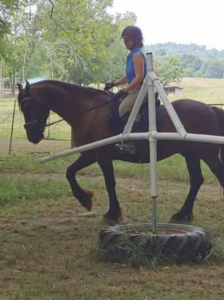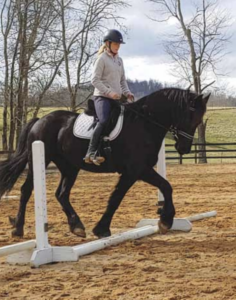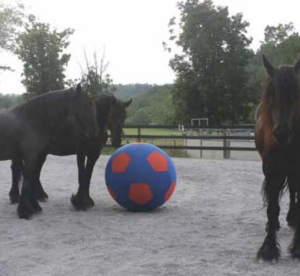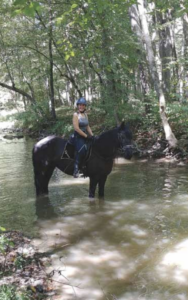The Friesian: Do Your Homework
in newsBy Lisa Baker
Many of us aspire to present our beloved Friesian horses at an inspection, expo, parade, show or demo at some point during our partnership with them. In preparation for that exciting day there are a numerous things that can be done on a daily basis at home to set them up for success. Our homework begins with everyday tasks.
 Groundwork
Groundwork
The first, and I feel the most important task for not only your relationship with your horse but also everyone’s safety, is your horse’s ability to respect your space. This begins with consistent, correct, fair handling:
- Asking them to politely move away when you groom or blanket them in their stall without attitude.
- Giving to pressure when you lead them.
- Having the understanding with them to ask them to lower their head and focus on you when they are distracted.
This comes from trust and a helping of patient persistence. An equine skull can be used as a weapon (typically not intentionally), but you must be aware just in case. Instincts are real and should be understood, worked with, and redirected whenever possible. Be present when you spend time with your horses. You expect their full attention and out of respect for them, they should have yours.
A skill as basic as halt, walk, halt in hand is easy to overlook. We develop routines when we care for our horses and they are aware of them. Why not add in a few training moments daily? Ask your horse to halt and then perhaps be square or back up a step on the way out or in from turnout. When returning to the walk, require them to be prompt and walk with a purpose. Play with slowing down the walk and increasing the stride of the walk. Be mindful that when you do this you want your horse to relax his neck and shoulder and swing beside you at your pace.
Another habit we have all developed is always leading from the left and turning our horses in that direction after entering their stall, gate, or wash/grooming area. Be sure to practice turning away, as the runners working on the triangle require that skill and respect from your horse. Once they become handy at this exercise, try it at the jog or trot. Perhaps trot a straight line, return to the walk, turn them away from you and then pick up the trot again. This by no means needs to be at top speed (save that for our talented, athletic runners). Starting slowly in order to let the horse understand the concept will go a long way. It would be a good idea to occasionally add in a halt/back or set up to present as well.
 Trailer Skills
Trailer Skills
Not every horse has the opportunity to load on a trailer regularly. It is imperative that your horse gains this skill, not only for transportation to your event but, more importantly, in an emergency. Colic scares, vet emergencies or natural disasters are terrifying enough without the added stress of knowing your horse dislikes the trailer.
Make this a positive, non stressful experience. Feed meals on the trailer without tying or closing the door to start. Let them come and go on their own if safe to do so. Let them get comfortable. Use a buddy with more experience to help them gain confidence and keep them company. If they are happier with a buddy and you are planning to attend an event, ask the organizer if you can bring an extra horse. Most can accommodate. Go for a short road trip when they are ready and eventually start taking them places when they have proven to be reliable at loading.
Be sure your trailer is safe, especially if you don’t use it regularly. Check the floors, tire condition as well as pressure, bearings and that the electrical/brakes are in good shape. Check that the doors, windows, and vents work and that there are no wasp nests hiding. If you are using a stock trailer put a fly mask on to travel and never allow your horse to hang their head out a window when in transit. Be sure there is nothing that can cause respiratory issues for a long haul like musty hay or dirty shavings. Always keep a first aid kit and a trailer aid on hand when you’re travelling. Last, but not least, be sure your towing vehicle checks off all the safety boxes.
Fitness
Be creative about how you get your horse fit for inspection. If they are not yet broke to ride you can lunge in your round pen, arena, field, uneven terrain and over poles and/or cavaletti. Another idea is to ground drive everywhere. They become accustomed to wearing a bit and surcingle or harness and this exposes them to new scenery. If you have the luxury of a seasoned horse you can ride and pony from there – go for it! One of my favorite 3 year-olds I ever witnessed make star was ponied through the trails and on mountain roads – great brain, strong, healthy, happy, sound and FIT!!!
If they are broke to ride or drive, cross train them, with time in the arena, trails, fields, and hill work, all while being mindful of fitness level, temperature, condition of the footing and their character.
If they have a play drive, let them loose occasionally with a big ball. Set up trail obstacles or go to a clinic. A wooded area of your farm can turn into a fabulous adventure and change from arena training, especially in the summer heat. Logs, creeks (might need your floaties as we all know how much Friesians like to play in water!), ditches, pool noodles, a bridge, a big tire filled with dirt, a tarp on the ground or hung between trees will certainly get their attention.
Exposure
Getting your horse comfortable with routine care, and allowing this time to be relaxing, will help you when you are in a new environment. Horses do not like surprises so adding clippers, spray
bottles, blankets, hoof paint etc. at home will allow them to not be concerned at the event. Knowing how to tie safely is invaluable, especially if grooming at the trailer or bathing away from home. Please always use a breakaway or leather halter just in case.
Expose your horses to new things, as they become accustomed to their everyday surroundings:
- Try hanging up a banner or tarp on the rail of your arena. *Put a number on both sides of their bridle just like all horses (other than foals) will have at the inspection.
- Set up some trail type obstacles and incorporate them into your groundwork.
- Play music or voices like an announcer from a sound system. *Bring them to an indoor facility. Have other horses join you in the arena if they are normally worked alone or ask them to work alone if they typically have buddies.
- Let other qualified people handle your horse so they can learn to respect and respond to someone who perhaps communicates with them differently than you.
- Work with them on bad weather days as rain and wind can be a game changer when it comes to manners. As impressive as a “Friesian kite” can be, hanging onto the end of your kite string can become a challenge.
- Noise makers and whips are wonderful “tools” to help get our horses a bit showier. Use them minimally, if at all, in training. If overused horses become desensitized and will no longer react in the way we hope for in the moment.
 Foals
Foals
My opinion with foals is that they need to be handled and groomed by numerous, experienced people if their dam allows. They need to understand that humans can be trusted and will keep them safe in a new situation, no matter who it is. I watched a foal years ago at an inspection be handed off to the runner and in that moment, she turned into an ugly, scared, aggressive filly. Best guess is that her world had been highly sheltered until that day and she felt the need to defend herself. This reaction may have been prevented with a different sort of preparation.
Remember, foals need to practice all the adult skills such as leading, loading, grooming, hoof paint and wearing the pretty white halter too. No need to put a number on as the dam will wear it at their inspection. Asking your foal to practice being a “horse model” with lots of scratches as a reward will carry over to their big day.
Conclusion
Please remember that the runners we ask to handle our horses are not magicians. They are asked to present a horse they have never met or worked with, having been given no history about what to expect, on one of the most important days of that horse’s life (and I dare say some owners too). The more we as owners can do at home to help prepare our horse will set them up for a greater chance of success. Most importantly our horse will go home with us and still be our heart, soul and the amazing creature we fell in love with long before this exciting day.
ABOUT THE AUTHOR:
Lisa Baker Owner, trainer, competitor and ARIA certified instructor at Majestic Acres in Bluff City, TN. She has been a FHANA member and KFPS breeder for 20 plus years and has hosted the TN inspection for 15 years. An active member of her local FHAME chapter, a chairperson of the Education committee and is now pursuing her ESMHL (Equine Specialist in Mental Health & Learning) certification through PATH International.
The FHANA Resource Book
THE FHANA Resource Book is now available for order. This publication is good for all NEW and SEASONED members alike. Contact FHANA to obtain your copy today.

